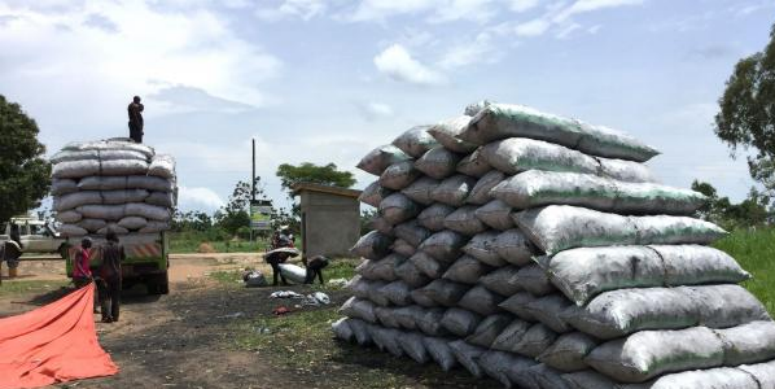Bags of Charcoal parked at a collection point adjacent to the Nimule Juba Highway in Pabbo Sub–county Amuru district.
Leaders in Gulu District have tasked the government to extend the ban on the issuance of documents facilitating the commercial production, trade, and movement of charcoal to all districts in the Acholi Sub-region.
Their call follows a directive issued by the State Minister for Environment Beatrice Atim Anywar last week banning the issuance of forest produces movement documentation for charcoal or timber from Gulu District.
The Minister in her letter dated January 11 noted that Gulu district has been the epicenter of environmental degradation in the sub-region owing to its central location along major transit routes. She also recalled all forest produce permit books issued to the district from the Ministry of Water and Environment with immediate effect.
However, leaders in the district say whereas the directive is a good move in conserving the forest cover, picking only Gulu among other districts in the Acholi sub-region won’t solve the vice of the commercial charcoal business.
Justine Kidega, the LCIII Chairperson of Unyama Sub-county says it’s not sustainable to enforce the directives in Gulu district alone when other districts in the region are still issuing movement permits for charcoal. He says extending the ban to all the districts in the region will enable joint monitoring of the directive and ease the fight against mass forest degradation.
Kidega also called on the government to consider reducing the cost of electricity as a means of persuading the locals from relying on wood fuel which is detrimental to the environment.
Patrick Komakech, the Patiko Sub-County Chairperson says the Minister’s directives contain gaps since it doesn’t address how the implementation will be handled and the penalties for offenders.
He says they are finding it difficult to implement the directive since most of the trucks are coming with charcoal from other districts in the region which have no ban on the movement of forest products.
Komakech expressed fears that the commercial production and trade of charcoal and other forest products in the region will continue if the ban is only maintained in Gulu District.
Following the directive from the Minister, Ismael Ochengel, the Gulu Chief Administrative Officer wrote to all the Sub-county officials in the district on Monday to start implementation immediately.
Ochengel noted that the respective sub-county leaders will be held responsible for non-compliance in implementing the directive.
David Ongom Mudong, the Aswa River Region Police Spokesperson in an interview Monday however says implementing the directive by police without a clear guideline will be a challenge.
Desmond Anywar an Environmentalist and founder of Intergenerational Action on Environment says there was a need for the Minister to conduct a wide consultation with various stakeholders in the region before coming up with the directive.
He says banning the issuance of charcoal movement permits in only one district leaving others to continue issuing isn’t a sustainable way of curbing the degradation of the forest.
Anywar says the district local governments had already passed an ordinance in place that seeks to regulate the production of charcoal at a sustainable level which the Environment Ministry should have studied for its relevance.
In 2019, the Joint Acholi Sub Regional Leaders’ Forum – JSRLF which comprises the eight districts in the Acholi sub-region drafted The Acholi Sustainable Charcoal Production and Marketing Bill, 2019. The bill among others sought to regulate the production of charcoal through sustainable means, and prohibit unlicensed charcoal production.
The bill was passed in December 2020 by the Kitgum district council but is yet to be adopted by other district councils in the Acholi Sub-region. Among its key components is the enhancement of the livelihood of the locals in the charcoal value chain through sustainable charcoal production.
-URN





